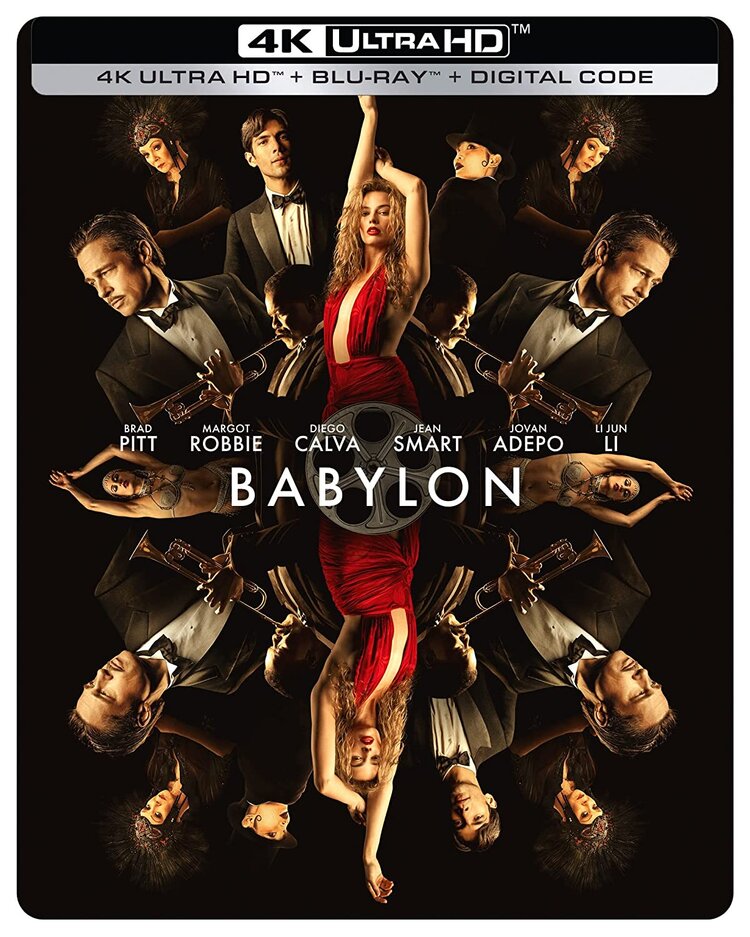
Babylon (2022; dir. Damien Chazelle) does for silent movies what Boogie Nights (1997; dir. Paul Thomas Anderson) did for ‘70s pornos.
It’s just not as good.
Both movies chart the rise and fall of a band of filmmakers. (Some work behind the camera, some are in front, and some exist on the margins [deeper in the shadows]). Both look hard at a circus designed to make other people happy (to stimulate and entertain filmgoers/voyeurs)—and the toll this takes on the folks who toil at this form in-demand, as it moves from a rough infancy to something based less in, shall we say, a spirit of anarchy. And both go for broke. They spare none of their characters from a hard, hollow, and-or humbling fate. Show business, each one seems to say, is a debauched, merciless grind.
Glamour’s but an illusion.
So, these are (a)moral tales, inspired by the careers of real people. In Babylon, the dashing, dimming star of Jack Conrad (Brad Pitt) is a play on actor John Gilbert, the shrill ‘it’ girl of Nellie LaRoy (Margot Robbie) is a take on Clara Bow, the gossip columnist Elinor St. John (Jean Smart) is a veiled Hedda Hopper, and the fluid Lady Fay Zhu (Li Jun Li) is a mold of actress Anna May Wong. Jovan Adepo plays Sidney Palmer, a jazz trumpeter who must choose between dignity and fame. Savvy viewers will spot the Fatty Arbuckle character and the Erich Von Stroheim/F.W. Murnau composite. The pretty but vacant Manny Torres (Diego Calva) is the movie’s center, a gofer-turned-producer who moves between high and low strata, as each character seeks success, and some kind of survival, in the meat market of 1920s Hollywood.
But where Boogie Nights takes a seductive, sweet, and honest approach to flawed and messy characters we care about, Babylon thuds like a giant defecating elephant (the subject of its first scene). In vain, it struggles to gain momentum as a dramedy of tragic proportions. Its obviousness—its straining desire to fling at us the blood, piss, puke, sweat, and tears the characters ooze, all in the service of crafting movie magic (and to just have fun and let loose)—suffocates.
This is partly the point, of course. Chazelle, however, tries too hard. I appreciate the big swing-at-bat this movie is. On as big a canvas as Paramount Pictures would allow this Oscar-winning wunderkind, he wants to lift the curtain on a world but glimpsed at in exceptional books like Kenneth Anger’s Hollywood Babylon and Hollywood Babylon II.
Chazelle drops captivating set-pieces (e.g., the struggle to film a knight’s kiss; Nellie’s first talkie; and the dark and depraved tour of the Hollywood sewers) between tired and-or shapeless ones (e.g., the dull orgy in the first reel, which introduces us to our main ensemble; Nellie’s visit to a sanitarium, and her attempt to rebrand her image and fit in with high society). To cap things in grand style, he even gives us a sentimental end montage of famous movie moments that I suppose is his (failed) way of saying that the magic of the medium is worth the human cost paid (i.e., the exhaustion and defeat). That art redeems.
Oh, really?
Chazelle’s ambition is part of the show. When I saw Babylon in the theater, I leaned into it. On rewatching it for this review, I found much of it tedious. The pace is the core problem. Chazelle has energy and ideas to burn; and yet I’m hard-pressed to say whether the movie (which clocks in at 188 minutes) would be better at twice, or half, the length. The tapestry he tries to weave is too big for its runtime, yet some roles strike me as under-imagined; and this last fact adds a deflating factor. Halfway through the movie (when the characters must deal with the transition to talkies), we’re spent. The movie isn’t breathing as it should. Chazelle and co. could have stretched, trimmed, or jettisoned parts of it to bring off the cinematic symphony he envisioned, but which parts and how he and his editing team might have shaped them—I can’t say. I suspect, though, the issue involves more than just the edit. I wonder if the script needed another pass.
Still, Babylon has much to commend it. Shot by Linus Sandgren, the movie evokes old L.A. (and its industrial hub, Hollywood) as well as any movie I’ve seen. (I especially love the moment when Nellie dances to her car as the sun rises over the desert hills of a then-nascent Bel Air.) Composed by Justin Hurwitz, the score sticks with you. It recalls the jaunty, vaudeville panache of an earlier time without feeling on the nose. Everyone in the cast appears committed to their roles, too. Pitt and Smart, both excellent, share a quiet scene of truth-bearing that hits like a freight train. As a manic director, Spike Jonze shines. There’s also a funny bit where Manny reins in a crowd of extras from skid row. I don’t even mind the Singin’ in the Rain (1952) callbacks.
Babylon is not a film that feels like it’s the product of a corporate committee. For all its faults—for all its cokey, boozy bloat—it is an adult spectacle. A brazen, poison love letter to Hollywood made by a guy who’s fascinated by film and film lore. Chazelle wants to impress, and does—even if you sometimes want to pull his ear.
The movie stays with you.
Within the 4K steelbook of Babylon are three discs, and digital access to the film. You can view the film on a 4K disc and a Blu-ray disc. A third Blu-ray offers a string of special features: A Panoramic Canvas Called Babylon; The Costumes of Babylon; Scoring Babylon; and deleted and extended scenes.